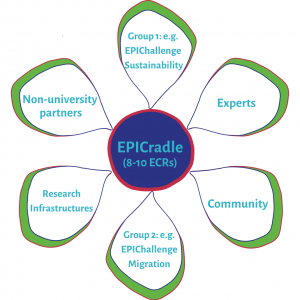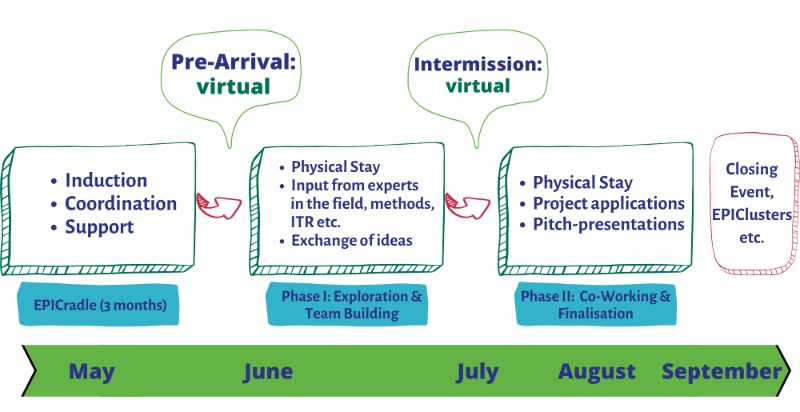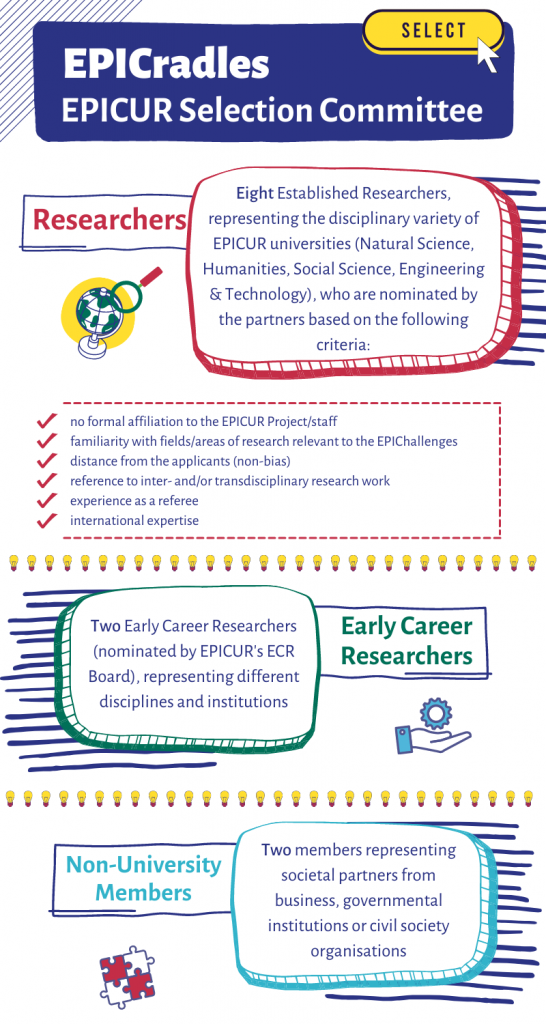 EPICradle noun
EPICradle noun
E.PI.Cra.dle I \ ˈe-pi-ˌ krā-dᵊl \
= the combination of EPICUR and cradle
= the framework and support structure to make great ideas grow
The first round of EPICradles already took place in 2022. If you want to know more about it, click here.
An EPICradle is a unique opportunity for Early Career Researchers to receive funding and institutional support while developing new, interdisciplinary and/or transdisciplinary, challenge-based projects that are beneficial to society in addressing such broad themes as Sustainability, Mobility/Migration/Identity, and Public Health, known as the EPIChallenges.
 The fellowships will be organized as hybrid formats of mobility and run for approximately three months. They will bring together two groups of up to five ECRs from different partner universities for virtual and physical collaboration. Both groups will be working on topics relevant to one or more of the EPIChallenges (Sustainability, Mobility/Migration/Identity, Public Health Transitions) and will have the chance to invite EXPERTS to discuss their ideas and project applications with.
The fellowships will be organized as hybrid formats of mobility and run for approximately three months. They will bring together two groups of up to five ECRs from different partner universities for virtual and physical collaboration. Both groups will be working on topics relevant to one or more of the EPIChallenges (Sustainability, Mobility/Migration/Identity, Public Health Transitions) and will have the chance to invite EXPERTS to discuss their ideas and project applications with.
Since the goal of EPICUR is to foster research careers that embrace interdisciplinary work as a mark of excellence and innovation, the format, its application and the selection procedures for an EPICradle specifically encourage the collaboration across disciplines.
In addition, EPICUR would like to enable and empower ECRs to seek out more transdisciplinary research, and therefore, the EPICradles provide opportunities to invite the COMMUNITY into the research process from the beginning, which may mean anyone from policy experts to entrepreneurs, from farmers to school teachers.
EPICradles will be unique in that they offer a space to try out new formats and develop innovative projects within an encouraging and supportive environment. Support will be given in form of stipends (3,000 € per participant + 5,000 € group budget) but also in terms of institutional support, such as access to the state–of–the–art RESEARCH INFRASTRUCTURE(S) available at the EPICUR partner institutions. Research infrastructures involve facilities, resources or services, including the main equipment or all instruments, collections, archives, scientific data, or other tools essential to achieve excellence in research and innovation.
NON-UNIVERSITY PARTNERS can be part of the EPICradle in two ways: firstly, participants may choose to include artists or activists who work closely with research and teaching, contributing significantly to the advancement and transfer activities (communication, public engagement, etc.) into their groups as full-members. Secondly, partners outside academia may be invited to join the EPICradle as advisors, mentors, or contributors of data, materials, or questions. The form of collaboration with non-university partners will be open to the applicants’ decision, and EPICUR is committed to making innovation in this regard possible. Particularly, EPICUR seeks to encourage the integration of marginalized and underrepresented groups within its activities by offering new ways for collaboration and engagement.
As the pandemic remains a constant in our lives, our Early Career Researchers as well as EPICUR staff will have to remain flexible. EPICradles, with their hybrid formats, will take approximately three months, starting in May/June 2022 and running through latest mid-September 2022. The closing event will be part of EPICUR’s Final Event on September 14/15, 2022. This will allow the groups to submit their project applications – if they wish to do so – for the EPIClusters. Physical stays will be taking place in June/July and August/September at the University of Freiburg and the partner universities within close geographical proximity (UHA Mulhouse, UNISTRA, KIT), depending on the needs and interests of the groups. Additional field trips may be taken.

The EPICradles will consist of two physical meeting phases (about two weeks each) connected through a virtual intermission, during which the groups will be able to communicate and develop their ideas virtually. In a closing event, participants will be able to share their results and reflections on the EPICradle with the EPICUR alliance and the wider public.
Phase I: Exploration & Team Building: focusing on the exploration of their topics as well as on team building, this first two-week in-person meeting will feature expert talks, workshops, discussions, and co-working sessions. By the end of the first phase, groups will have developed a roadmap for the writing of their research projects/proposals.
Intermission: Virtual Co-Working & Meet-ups: Between the in-person phases of the EPICradle, participants will have access to virtual co-working spaces, where they will receive support from EPICUR Research staff and established researchers. Additionally, EPICUR partners will provide the ECR groups with access to relevant online research infrastructures, thereby further fostering the exchange between universities and nations.
Phase II: Co-Working & Finalization: Returning to the EPICradle host institution, participants will finish their research project proposals and create output useful for their own professional and academic development. In addition, the groups will have the opportunity to present and discuss their projects with experts and societal stakeholders.
Application and selection procedures of an EPICradle conform to the standards of hiring practices put forth by the European Commission, ensuring fair selection and recruiting practices of Early Career Researchers and taking steps towards advancing the gender balance and representation of minorities in higher education institutions.
Applications for EPICradle(s) opened on March 15th, 2022, and were officially closed on April 15th, 2022.
The EPICradle is aimed mainly at Early Career Researchers, who wish to develop interdisciplinary teams of researchers and to turn their research ideas into project proposals. Within each group, one or two applicants may be working at non-university or non-academic institutions provided that they can prove a sincere interest in pursuing research or research-relevant careers in the future. All potential applicants must be eligible and be able to spend 2×2 weeks in any of the EPICUR universities, and have an official affiliation with at least one partner university.
The application must be written in English and should not exceed 15 pages, including all the relevant documents and elements. The application must be submitted by a designated corresponding author for a group of 3-5 ECRs and needs to include the following:
Basic Information (to be entered in Application Portal):
Project Application, Budget Proposal and Appendices will have to be submitted via the Application Portal using the templates provided below:
“Project Application” [PDF]:
“Budget Proposal” [PDF]: Please note: the PDF template appears to be faulty and doesn´t allow to fill in the individual boxes. Please, just set up a PDF document in the style of the actual template with your information filled in. We are really sorry for the inconveniences and apologise for that!
“Appendices” [PDF]: Please note: the PDF template appears to be faulty and doesn´t allow to fill in the individual boxes. Please, just set up a PDF document in the style of the actual template with your information filled in. We are really sorry for the inconveniences and apologise for that!
PLEASE NOTE: The application portal for the EPICradles does not save progress; applications must be submitted in one sitting. You may access the portal starting March 1st but only applications submitted between March 15th and April 15th will be considered for the selection process.
Only complete applications can be considered for the selection process. Please ensure that you submit only after you have uploaded all relevant files and entered all information. If you have questions regarding the templates or certain elements of the application, please reach out to epicur-research@mail.uni-freiburg.de.
The selection procedure for the EPICradle is a two-step process. Applications will be assessed first for their eligibility, so as to verify whether all the required documents have been submitted and the submissions fulfil the basic eligibility criteria.
In the second step, applications will be forwarded to a Selection Committee that will review and rank applications according to the selection criteria listed below, alternating between EPIChallenges to ensure that the final selected groups address different challenges. The Project Coordinator will then inform candidates in writing of whether they have been accepted to the program.
Step 1:
After the application period closes on April 15th, 2022, the applications will be assessed by EPICUR staff with regard to their fulfilment of the following eligibility criteria. These are split into must-haves (hard) and nice-to-have (soft) criteria. Fulfilling the soft criteria will be an advantage in the final selection.
Hard eligibility criteria:
Soft eligibility criteria:
Step 2:
The applications which pass this first eligibility check will be submitted to the final step of selection by an independent Selection Committee.
EPICUR Selection Committee:

The Selection Committee will provide a written assessment on the research proposals and meet virtually for a 1-day selection session, creating a ranked list of the groups. If there are more than eight projects submitted, the Selection Committee has the option of inviting the groups to briefly present their intended project and respond to questions from the Committee (this will be reassessed after the pilot).
Including a broad range of researchers will ensure that scientific merit and academic integrity will be duly considered along other criteria important to the project. This organization of the process is reflective of other selection procedures common in EPICUR universities and funding organizations but also amends it by including different stakeholders and including submission criteria that aid non-linear career paths.
The Selection Committee will base its decisions on the following qualitative criteria, which weigh different aspects of the application according to the goals of EPICUR Research to promote European, interdisciplinary research careers for ECRs and to encourage transdisciplinary collaboration. The qualitative criteria are:
Qualitative Criteria:
Equality, Diversity, Inclusion Disclaimer
Where two groups are equally suitable for funding, groups which bring together more candidates of the underrepresented gender in the relevant academic field shall be given priority. Where the academic quality is the same, groups who successfully address and engage with questions of EDI shall be given priority.
***Applications currently under revision***
If you have any questions or concerns about EPICradles, the application or selection process, please do not hesitate to contact us: epicur-research@mail.uni-freiburg.de
